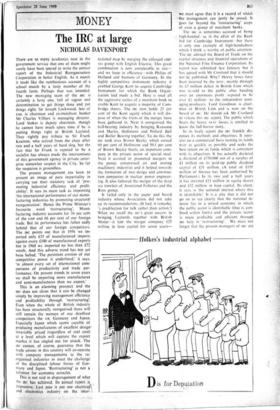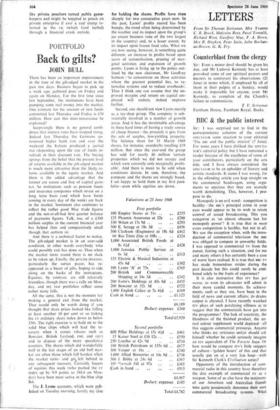The IRC at large MONEY
NICHOLAS DAVENPORT
There are so many academics now in the government service that one of them might surely have been spared to write the annual report of the Industrial Reorganisation Corporation in better English. As it stands it reads like the rumbustious account of a school match by a lusty member of the fourth form. Perhaps that was intended. The new managing team of the IRC is certainly a lusty one, full of vigour and determination to get things done and put things right. Sir Joseph Lockwood, late of EMI, is chairman and ex-merchant banker Mr Charles Villiers is managing director. Lord Stokes is deputy chairman, though he cannot have much spare time if he is putting things right at British Leyland. They rightly pay tribute to Sir Frank Kearton, who retired from the chair after two and a half years of hard slog, but the fact that Sir Frank is reputed to be a socialist has always made the interventions of this government agency in private enter- prise somewhat suspect in the City. So far the suspicion is groundless.
The present management are keen to present an image of pure impartiality in carrying out their statutory task of 'pro- moting industrial efficiency and profit- ability'. It sees its main task as improving 'the international performance of our manu- facturing industries by promoting structural reorganisation'. Hence the Prime Minister's favourite word 'restructuring'. Mand- facturing industry accounts for 34 per cent of the GNP and 66 per cent of our foreign trade. But its performance has fallen sadly behind that of our foreign competitors. The IRC points out that in 1956 we im- ported only £35 of manufactured imports against every £100 of manufactured exports but in 1968 we imported no less than £72 worth. And this adverse trend has not yet been halted. 'The persistent erosion of our competitive power is underlined,' it says, 'in almost every set of international com- parisons of productivity and trade per- formance. On present trends in seven years we shall be importing more manufactures and semi-manufactures than we export.'
This is an alarming prospect and the IRC does not claim that it can be changed simply by improving management efficiency and profitability through 'restructuring. Even when the whole of British industry has been structurally reorganised there will still remain the menace of our deadliest competitors the us, Germany and Japan. Especially Japan which seems capable of producing manufactures of excellent design' invariably priced (regardless of real cost) at a level which will capture the export market it has singled out for attack. The IRC cannot, of course, guarantee that the trade unions in this country will co-operate with company managements in the re- organised industries to meet the challenge of the disciplined labour forces of Ger- many and Japan. 'Restructuring' is not a talisman for economic miracles.
This is not said in disparagement of what the IRC has achieved. Its annual report is impressive. Last year it put our electrical and electronics industry on the inter- national map by merging the enlarged GEC- AEI group with English Electric. This great combination is now comparable in size— and we hope in efficiency—with Philips of Holland and Siemens of Germany. In the highly competitive instrument industry it enabled George Kent to acquire Cambridge Instrument for which the Rank Organ- isation had made a bid. Here is used all the aggressive tactics of a merchant bank to enable Kent to acquire a majority of Cam- bridge shares. The IRC now holds 25 per cent of the Kent equity which it will dis- pose of when the fruits of the merger have been gathered in. Next it reorganised the ball-bearing industry by bringing Ransome and Marles, Hoffmann and Pollard Ball and Roller Bearing together. To do this the lac took over Brown Bayley which owned 60 per cent of Hoffmann and 50.1 per cent of Brown Bayley Steels, an important com- pany in the private sector of special steel. Next it assisted or promoted mergers in the pump, compressed air and mining machinery industries and it helped towards the formation of two design and construc- tion companies in nuclear power engineer- ing. It also fathered the merger of the deep sea trawlers of Associated Fisheries and the Ross group.
It failed only in the paper and board industry whose Association did not take up its recommendations. (It had, it remarks, 'a predilection for talk rather than action.') When we recall the IRC'S great success in bringing Leylands together with British Motor—it lent the merger company £25 million in loan capital for seven years- we must agree that it is a record of which the management can justly be proud. It goes far beyond the 'restructuring' scope of even a group of merchant banks.
The IRC is sometimes accused of being high-handed—as in the affair of the Rank hid for Cambridge Instrument—but there is only one example of high-handedness which I think is worthy of public attention. The IRC advised the Board of Trade on the capital structure and financial operations of the National Film Finance Corporation. Its report was submitted last January but it has agreed with Mr Crosland that it should not be published. Why? Heavy losses have been incurred by the nirrc. mainly through its £3 million deficit in British Lion which was re-sold to the public after handing over an enormous profit--reputed to be over LI million—to the independent man- aging-producers. Lord Goodman is chair- man of British Lion and is now on the board of IRC. He should ask Mr Crosland to release this IRC report. The public which bears the heavy NIFC losses is entitled to know the full horror story.
In its lively report the IRC frankly dis- cusses its methods and objectives. It oper- ates on a commercial basis turning its funds over as quickly as possible and seeks the best return on its funds which is consistent with its objectives. It has actually declared a dividend of 1E750,000 out of a surplus of £1 million on its paid-up public dividend capital of £31 million. (A total of £150 million of finance has been authorised by Parliament.) In its two and a half years it has invested £13 million in equity shares and £52 million in loan capital. Its client, it says, is 'the national interest where this is identifiable'. It is a pity that it did not go on to say clearly that the national in- terest lies in a mixed economy in which the public sector is identifiable (that is, con- fined within limits) and the private sector is made profitable and efficient through inc help in 'restructuring'. We must not forget that the present managers of IRC are
like private poachers turned public game- keepers and might be tempted to poach on private enterprise if ever a real slump re- turned to the ux (which God forbid) through a financial crash outside.



































 Previous page
Previous page